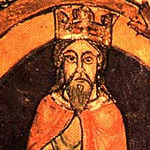St David of Scotland and the Solemnity of the Translation of St Dominic

St David of Scotland
Scotland's greatest king was the sixth and youngest son of St Margaret of Scotland and Malcolm III, born in 1085. He married Matilda, daughter of Waldef, the Anglo-Saxon Earl of Northampton and Huntingdon which gave him a claim to the earldom Northumberland.
For many years he waged a long and unsuccessful war against England, but after being crowned king of Scotland in 1124, around the age of 40, he devoted his life to peaceful activities and became known as a kind, just and liberal king.
Historians say he was responsible for making Scotland into a modern nation, by reforming the legal system and public administration and encouraging trade and the foundation of towns. He also encouraged the Scottish church to establish a system of dioceses. Under his rule many monasteries, hospitals and almshouses were founded.
David prayed the Divine Office daily, received Communion each week and gave generous alms to the poor - often in person as his mother had done. He died on this day in 1153 and was buried at Dunfermline. His shrine was a popular place of pilgrimage until the Reformation. One of the patron saints of Scotland, many churches are named after him.
and the Solemnity of the Translation of St Dominic
Today is also the Feast of the Translation of St Dominic, which is described thus in the Dominican breviary: "In accordance with his wishes, St Dominic was buried 'beneath the feet of his brethren' in the church of St Nicholas of the Vineyards, Bologna. Many of the sick avowed that they had been healed of their infirmities at his tomb; the brethren however were loath to recognize these miracles and accept votive offerings. However, on 24 May 1233, at the urging of Gregory IX and in the presence of Theodoric, archbishop of Ravenna and papal legate, Dominic's body was moved to a marble sepulchre during the celebration of a General Chapter at Bologna attended by Bl Jordan of Saxony and many brethren. Immediately a certain marvellous odour came forth from his sacred body, 'showing clearly to all how much the saint had truly been the aroma of Christ."












